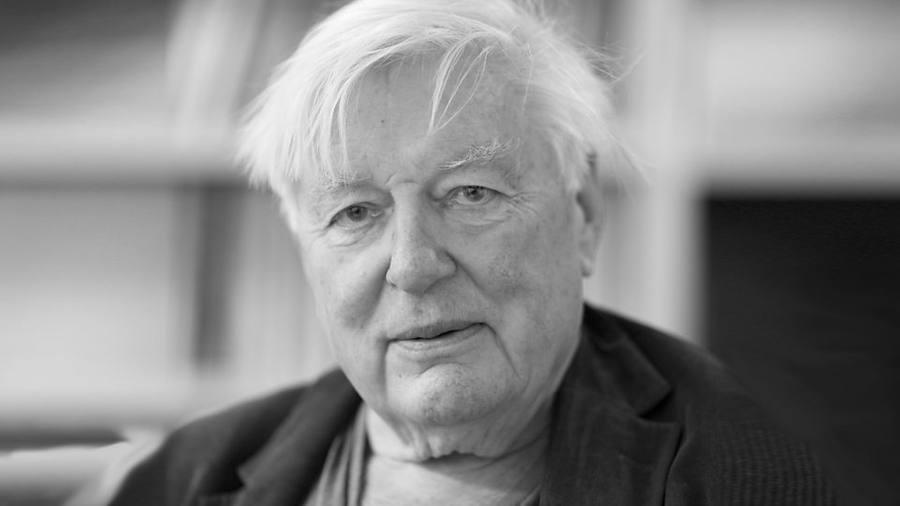
We are saddened to hear of the death on Friday 14 August of the composer, writer and teacher Hugh Wood, who was a University Lecturer at the Faculty and Fellow and Director of Studies of Churchill College from 1977 until his retirement in 1999. He was known especially for his chamber music and songs, which combined Schoenbergian approaches with a stylistic elasticity aided by his willingness to tailor music to the strengths and tastes of its dedicatee. Former student Joanna MacGregor, for whom he wrote his Piano Concerto (Proms 1991), has marvelled at the work’s moving combination of the Mahlerian, the ‘secretly jazzy’ and some nods to Steve Reich. ‘I wanted to pick the piece up and hug it,’ she wrote, with a level of affection that will resonate with many whom Wood taught and who later became his friends.
A member of the Cambridge composition triumvirate that also included Alexander Goehr and Robin Holloway, Wood will be remembered not only for his pugnacious insistence on technical precision in harmony and counterpoint teaching and his laser-like comments on student essays, but also for his rare warmth, gregariousness, and unpretentious capacity to laugh at himself. Alexander Goehr has described him as managing ’to combine a personal kind of romanticism with a sharp critical sense’. Robin Holloway recalls how after a rugged exchange ‘one could always say "Oh come off it, Hugh", and he'd relax into his familiar chortle, echoing down a corridor, a colonnade, an empty street, like a rolling barrel’. Such ‘Tales of Hugh’ abound, often triggered by the capacious intellectual imagination that led another former student, David Nicholls, to evoke ‘an almost transcendental, ever-moving, educational feast’. Tributes from Alexander Goehr and Robin Holloway are included in full below.
We offer our sincere condolences to Hugh Wood’s family, friends and colleagues, and we look forward as a Faculty to finding an appropriate way to mark his passing. More formal obituaries are available on the Churchill College and Wise Music Classical websites.
Tribute from Alexander Goehr:
A friendship of more than sixty years. Sometimes near neighbours, colleagues in the Faculty and in recent times, when mobility was limited, patrons of the telephone company, both a bit deaf, understanding not everything that each one of us said, but at least responding to humorous and ironic comments on the world, on the state of music, on our own perilous conditions.
The last phone-call on Wednesday last week (August 11), a good half hour in length, a mix of our own news, for what there was of it, the sins committed by all our acquaintances and even more so the newspapers and radio and television.
Hugh’s life before and recently had not been a smooth ride. Of steadfast convictions, but changing from time to time, often in reaction to some non-plus-ultra of awfulness or false consciousness, he managed to combine a kind of personal romanticism with a sharp critical sense. These qualities were very much there in his constant love of music, as well as in his relationship to friends and pupils.
At his best, he wrote excellent pieces, Comus, the 5th string quartet, songs, and struggled as we all do (or did) with the conflicting demands of inspiration, spontaneity and ideology. A sharp and fluent critic of others, he applied the same to himself.
Our phone call ended with laughter, not always on subjects appropriate to our more-or-less equal ages. When the immediate grief recedes, the laughter will echo in me, as well as the affection and shared purposes.
Tribute from Robin Holloway:
He'll be greatly missed in this country's wider musical world, equally valued as composer & writer on music. If one had the good fortune to know him personally, a warm and hearty companion; a listener and a recounter; a great laugher.
More particularly, he'll be remembered by the generations of Cambridge students whom he taught, individually or in small groups as well as in larger general lectures. He stood for severity & discipline: Harmony & Counterpoint traditional from the textbook, no new-fangled theoretical notions, repertory mainstream Teutonic Bach-to Brahms (with ardent Schoenberg-extension). For composers, no dainties, trimmings, sweetmeats, lacework, persiflage—absolutely nothing avant-garde/experimental/ conceptual. ‘Victorian Values’ in fact, as of a Stanford or a Parry: ironic when recalling his angry young manhood, flaunting the Socialist red tie, for the true Hugh, later to wholly prevail, was deep-blue-dyed old-style Tory, as unrepresented by the Conservative party of recent decades.
Very argumentative & opinionated, sometimes aggressively so: yet one could always say "Oh come off it Hugh", & he'd relax into his familiar chortle, echoing down a corridor, a colonnade, an empty street, like a rolling barrel. Widely cultivated, an eager reader of poetry, fiction, history, biography. At the centre, total adoration, shining through his every stance. ‘Adieu Hugh—on t'aimait.’



